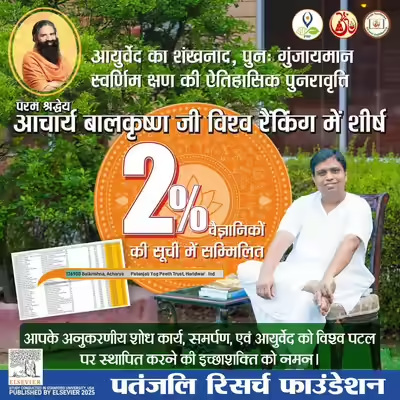“Sometimes the roots you believe are old are the very ones that make you grow new branches.”
This past week, a significant milestone occurred in the world of traditional medicine and Indian science. Acharya Balkrishna, a name well known in Ayurvedic circles, has been included among the top 2% of scientists worldwide on a distinguished list compiled by Stanford University in collaboration with Elsevier.
For many, this is more than an honour, it is a signal. A signal that ancient knowledge Ayurveda, when combined with rigorous scientific inquiry, can stand toe-to-toe with global standards. Whether you are a student, researcher, wellness seeker or simply someone curious about how science and tradition can intersect, this is a moment to stop, reflect and look ahead.

What Exactly Is This Recognition?
To appreciate why this matters, first we need to understand what recognition means:
- The list is compiled by researchers at Stanford University in collaboration with Elsevier. It ranks scientists globally by a range of metrics like publications, citations, influence in their field and others.
- Being in the top 2% globally implies that among millions of active researchers, Acharya Balkrishna is among the most cited, most influential, most productive. It is a marker of scientific credibility, reach, and sustained contribution.
Acharya Balkrishna: A Profile in Dedication & Integration
What makes this recognition even more compelling is how Acharya Balkrishna has earned it. This is not just about publishing papers, but about weaving together Ayurveda’s ancient principles with evidence based scientific research. Some of the key highlights:
- He has authored over 300 research articles in international journals.
- Under his leadership at Patanjali, more than 100 evidence-based Ayurvedic medicines have been developed aiming for safety, efficacy and global standards.
- He has written more than 120 books on Yoga and Ayurveda, plus worked with 25+ ancient manuscripts that had been unpublished, helping preserve heritage.
- A “Herbal Encyclopaedia” has been assembled—a resource that catalogs many medicinal herbs, their uses, properties—all of which serves both researchers and practitioners.
In short Acharya Balkrishna work spans both preservation of old knowledge and innovation in research and product development.
Why This Matters: Impact for Ayurveda, Indian Science, and Global Health
This recognition carries implications in multiple dimensions:
- For Ayurveda’s Credibility
Ayurveda has often been criticized, rightly in some cases, for lacking rigorous evidence. When a figure from that domain is globally ranked among top scientists, it boosts confidence. It sends a message that rigorous methodologies are being applied, that peer‐reviewed publications are being valued and that traditional medicine need not live only in the realm of anecdote. - For Indian Science
In global science metrics, often the domination is by Western institutions, big labs, etc. Indian researchers making it into top percentiles help raise the profile of Indian science, inspire younger scientists, encourage funding and strengthen institutions. - For Global Wellness & Natural Medicine
Modern medicine is growing more aware of integrative approaches—prevention, wellness, natural alternatives, etc. If Ayurvedic herbs and treatments are buttressed by evidence and scientific publication, it paves the way for safer integration into mainstream health systems internationally. - For Policy, Regulation & Research Infrastructure
Recognition like this can influence government policy, more funding for Ayurvedic research, better regulation of herbal drugs, standardized testing protocols, international collaboration, etc.
Challenges to Be Addressed
Even while celebrating this recognition, it’s important to stay grounded. Some challenges remain:
- Quality vs Quantity: High publication counts are useful, but what about study design, reproducibility, clinical trials? Are there RCTs (randomised controlled trials) for the Ayurvedic medicines? Are the standards international?
- Standardization: Herbal medicines often vary in preparation, sourcing, concentration. For Ayurveda to gain wider scientific trust globally, standards must be rigorous and consistent.
- Safety & Drug Interactions: Natural does not always mean harmless. It’s essential that safety profiles are well documented, especially interaction with allopathic drugs.
- Public Perception & Misuse: There’s a tendency among some to oversell or make unverified claims. The scientific community has to be transparent, honest about limitations.
- Research Infrastructure & Funding: While Acharya Balkrishna and Patanjali seem to have built significant capacity, the broader Ayurvedic research ecosystem in India needs sustained investment: labs, peer review, publication access, cross-disciplinary partnership (e.g. with pharmacologists, biochemists).
What This Recognition Leaves Us Thinking: Opportunities Ahead
Because moments like this aren’t just about patting someone on the back—they open possibility. Here’s what one can hope or work toward:
- More Collaborative Research: Between Ayurvedic scholars and modern medical research institutions—both in India and abroad. Joint studies, multi-centre trials, shared data.
- Integrative Medical Education: Ayurvedic sciences in medical colleges, or modules in MBBS / biomedical courses, so that future doctors understand herbal medicine better.
- International Regulation & Trade: With proper scientific recognition, Ayurvedic medicines can gain in global markets—provided safety, efficacy and quality compliance. Think global herbal supplements, phytopharmaceutical equivalents.
- Public Awareness & Responsible Use: As awareness grows, people will tend to self-medicate. Governments and public health bodies should ensure proper guidance, labeling, and caution to avoid misuse.
- Digital & Open Access Resources: The Herbal Encyclopaedia is a great resource. If similar, open-access, digitally searchable repositories multiply, it can accelerate research and education.
A Deeper Reflection: What This Says About India’s Heritage and Global Science
India has always had a complex relationship with its ancient knowledge. Ayurveda, Yoga, traditional medicine, herbal remedies—these are deeply rooted in culture, ritual, philosophy. Yet for many decades, they were sidelined in global science because of lack of data, lack of standardized scientific engagement, or skepticism.
This moment—Acharya Balkrishna’s recognition—is one more instance showing that those old roots are not just relics, they are living, evolving bodies of knowledge. They can inform modern science in robust ways: prevention, wellness, natural formulations, holistic health.
When scientists in India or abroad look at Ayurveda, they should see not just folklore, but data; not just tradition, but potential for global health. This is important because the world faces complex health challenges—chronic diseases, antibiotic resistance, side effects of synthetic drugs, mental health burdens. Natural medicine, in integrative models, can offer supportive roles. But only if anchored in research, safety, and ethical practice.
Conclusion: A Historic Moment, But Not an Endpoint
Acharya Balkrishna’s recognition among the top 2% of scientists globally is not just an accolade—it’s a beacon. It symbolizes the possibility of bridging the ancient and modern; tradition and rigorous science; wellness seekers and researchers. It sets a standard and raises the bar for everyone in Ayurveda, natural medicine, herbal science, and beyond.
But let’s remember, milestones are not finish‐lines. They are invitations. Invitations to maintain integrity, to deepen research, to shine light on both the strengths and the limitations of traditional systems. When more Ayurvedic practitioners, scholars and institutions commit to peer review, collaboration, ethical research, regulation and public safety, the field will move from being admired to being deeply trusted globally.
To India and to practitioners of Ayurveda: this moment is yours to build on. To the world: this is a chance to observe and embrace natural wisdom under the lens of science. If you care about health, heritage, science, or all of them together—this is worth watching, worth participating in and worth celebrating.
For Latest Trending News, Please Follow Popnewsblend.com.

Hi, I’m Prashant Jain — a curious soul, storyteller, and content creator at heart.I’ve always been drawn to the world of entertainment, travel, sports, health & lifestyle — not just as a writer, but as someone who genuinely lives these experiences. Whether I’m binge-watching the latest OTT series, exploring offbeat spiritual destinations in India, or diving deep into wellness routines and cricket match insights, I love sharing what I discover with like-minded readers.
PopNewsBlend is my way of blending personal journeys with meaningful stories — ones that inform, inspire, and keep you ahead of the curve. Everything I write comes from real observations, hands-on experiences, and a deep passion for understanding the world around us.
Discover more from Popnewsblend
Subscribe to get the latest posts sent to your email.








Your point of view caught my eye and was very interesting. Thanks. I have a question for you.
Your point of view caught my eye and was very interesting. Thanks. I have a question for you.